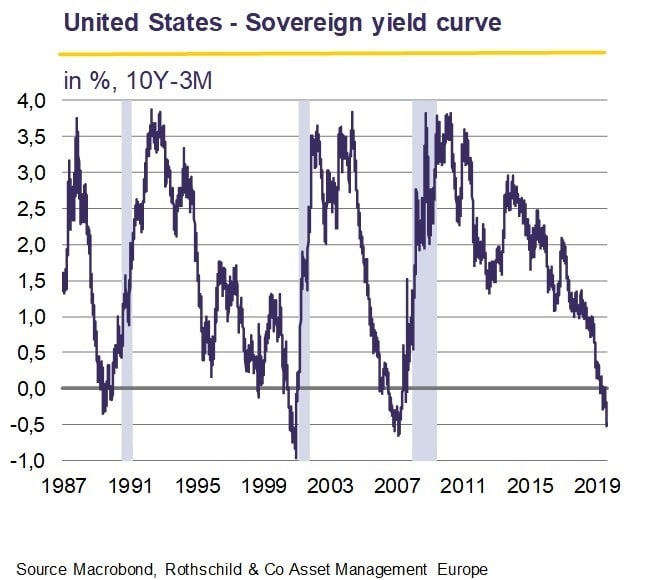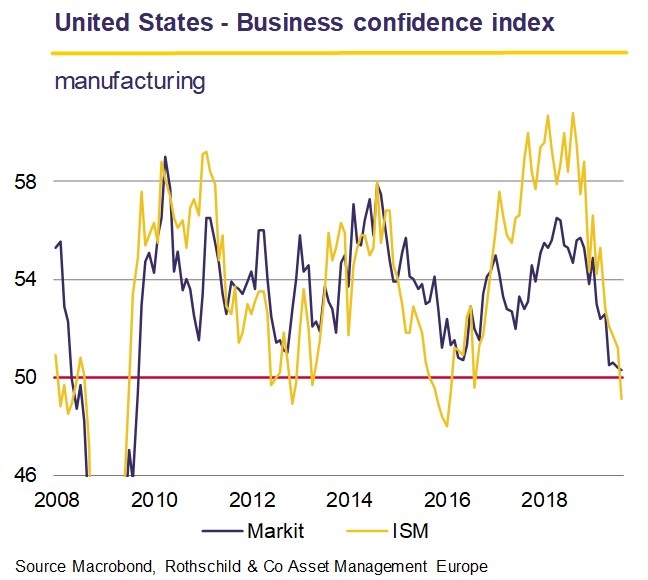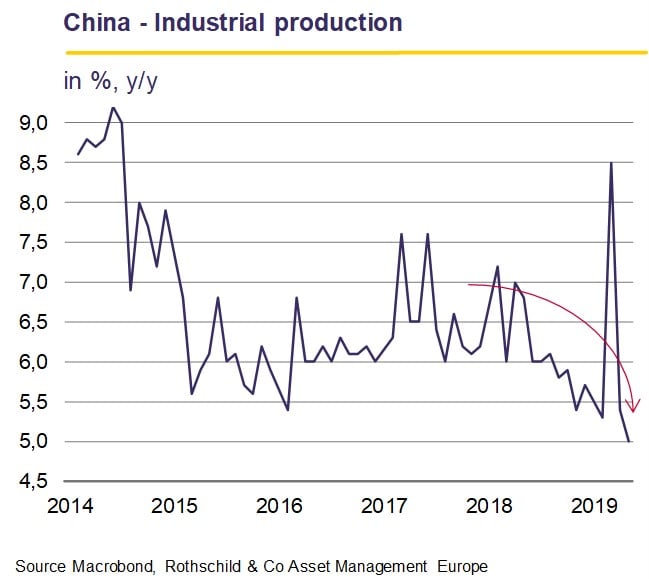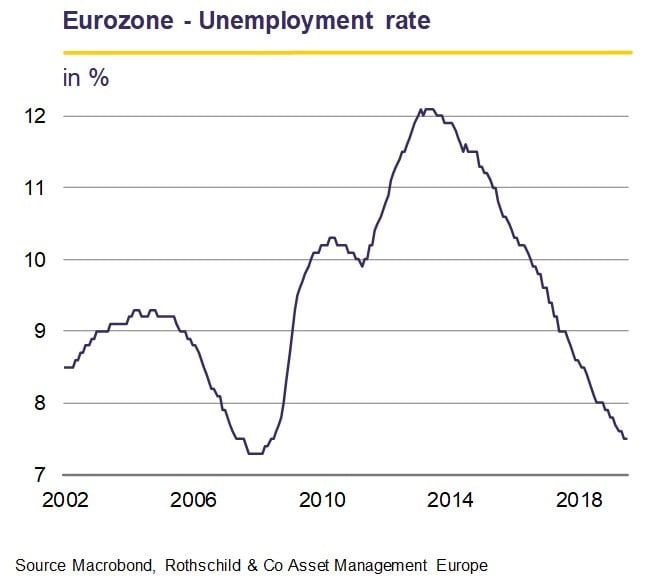Asset Management Europe: Monthly Letter – September 2019

Marc-Antoine Collard, Chief Economist, Head of Economic Research, Asset Management, Europe
Economic environment
Confronted with significant political risks and growing trade tensions, central banks have decided to (re)introduce monetary easing measures, which has reassured equity investors hoping that the global growth slowdown will thus be stopped. However, the continued appreciation of the USD, the collapse of world sovereign rates and the marked inversion of the US yield curve all point to doubts about the effectiveness of the expected monetary easing as central banks are pushing harder on a string. In fact, the downward revisions to global growth continue - now including the US even though some market participants had predicted a decoupling from the global business cycle - against the backdrop of a US president whose economic and geostrategic actions have become increasingly unpredictable.
Click the image to enlarge
Although it is in the interest of both countries to find a durable solution, the Sino-US trade war has indeed clearly escalated. Since 1 September, the Trump administration has implemented tariffs of 15% on part of the remaining USD300bn of imports from China which had so far been spared. From 1 October, tariffs on USD250bn imports will be raised from 25% to 30%. By the end of 2019, the total of some USD540bn Chinese imports will be taxed, with a final salvo of tariffs scheduled for December 15. These measures have harmed business confidence significantly, yet President Trump continues to ignore the many warnings about potential negative economic repercussions, preferring instead to incriminate virulently the Fed's policy.
Click the image to enlarge
For the time being, Chinese and US officials are struggling to agree on the schedule for a planned meeting and it seems that no real progress has been made on the delicate issues of technology transfer and subsidies to Chinese state-owned entities. Refusing to cave in, China has become less flexible despite being affected by its own economic slowdown. The authorities plan to provide more support for the economy, including investing in infrastructure projects and regional development. However, for over a year now, China has attempted to stabilise, even boost, economic activity, but failed to achieve convincing results. Admittedly, room for maneuver remains, but investors could be disappointed by the effectiveness and the extent of supporting measures as the economy faces high debt, shadow banking regulation and pollution constraints that should not be underestimated.
Click the image to enlarge
Meanwhile, the yuan resumed its decline against the USD and posted its worst month since China's currency reform in 1994. Yet, the depreciation is not without risks because it could penalise domestic demand and revive capital outflow risks, while foreign exchange reserves are lower than before on a relative basis. More broadly, it will also weigh on other emerging currencies, thus endangering financial stability. In addition, another trade war broke out in the region, this time between Japan and South Korea. The two countries experienced an intensification of their trade disputes compensate South Koreans forced to work in their factories during the Japanese occupation. While the direct impact of protectionist measures remains difficult to assess, collateral damage is being felt in the two countries already suffering from the Sino-US trade war and the global economic slowdown.
The eurozone is unfortunately not spared from the degraded international context. Economic activity in Q2 2019 was sluggish, recording a growth of barely 0.2% t/t. Italian growth stalled while German GDP fell by -0.1%. France (0.3%) is timidly outperforming and only Spain (0.5%) remains somewhat robust. The consensus now anticipates an improvement in the eurozone in S2 2019, supported by a still strong labor market, as evidenced by the 7.5% unemployment rate in July, the lowest since 2008. In addition, business confidence in the service sector remains well oriented, decorrelated from the recession of the industrial sector. What's more, the Italian political situation seems to have calmed down. The agreement reached between the 5 Stars Movement and the Democratic Party contributed to the drop in sovereign rates due to the greater proximity of this coalition with Brussels and EU rules.
Click the image to enlarge
Nevertheless, the two parties still need to come to an agreement on the political agenda, and the 2020 budget remains a major challenge. Indeed, the cancellation of the VAT increase sought by the new government represents a shortfall of some EUR23bn to be offset by a reduction in expenditure and/or an increase in other sources of income. At the same time, German factory orders dropped again in July (-2.7% m/m), aggravating the industrial slump, and retail sales also fell (-2.2% m/m). In fact, in light of ongoing international trade conflicts and weak business expectations, namely in manufacturing, no fundamental improvement in momentum is in sight for the coming months Correspondingly, economic prospects for export-reliant Germany remain uncertain and the Bundesbank has warned GDP could contract in Q3 2019, triggering a technical recession defined as two consecutive quarters of declining output.
Meanwhile, UK PM Boris Johnson maintains his steadfastness over Brexit and prorogued Parliament from 11 September to 14 October, limiting the time available for MPs to take action against the government. The growing prospect of an early election is not in itself an assurance of an improvement in the situation as polls do not dismiss, for the moment, the probability of a majority Conservative government led by a PM who keeps on repeating that the UK will leave the EU on 31 October, with or without a deal. In sum, a thick fog continues to veil the final outcome over Brexit, causing a depreciation of the pound and a fall in business and consumer confidence.
Download the PDF version Monthly Letter (634 KB)



